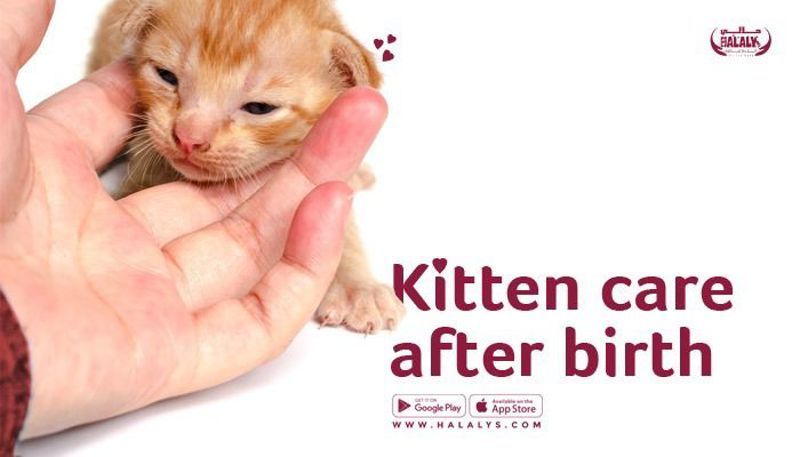Nothing is quite as heartening as having new kittens around. Their tiny paws, soft mews, and the way they nuzzle close to their mother – it’s a magical experience.
But with this bundle of joy comes a set of responsibilities that can seem daunting, especially if it’s your first time.
Fear not! Whether you’re a new cat owner or you’ve had cats a long time ago, understanding kitten care after birth is crucial. Let's dive into the world of kitten- care after birth and explore how to give them the best start in life.
Kitten Care After Birth: Initial Steps
We know that you may be confused and do not know what to do after kittens are born.
The first few hours after kittens are born are critical. Immediately, the mother cat will naturally tend to her kittens, cleaning and stimulating their breathing by licking them. Your role here is primarily supportive. Ensure that she has everything she needs and be ready to step in if something seems off.
If you want to know how to care for a pregnant cat before and after birth, read this blog.
Creating a Comfortable Environment
Newborn kittens and their mother need a warm, quiet, and safe environment. Choose a secluded spot in your home where the mother cat feels secure. A clean, soft bed with adequate padding will provide comfort. Ensure the area is free from any disturbances.
Maintaining Warmth
Newborn kittens cannot regulate their body temperature effectively. It's vital to keep them warm. Use a heating pad for pets or hot water bottles wrapped in towels. Monitor the temperature closely to avoid overheating.
Monitoring the Health of Kittens
In the early days, keep a close watch on the kittens' health. Check for regular nursing; kittens should nurse frequently and appear content and plump. If a kitten is crying excessively or appears lethargic, it may indicate a problem. In such cases, consult a veterinarian immediately.
Nutritional Needs of Newborn Kittens
Mother’s milk is the best source of nutrition for newborn kittens. It contains essential antibodies that help build their immune system. Ensure the mother cat has a nutritious diet to support milk production. In cases where the mother cat cannot nurse, you will have to bottle-feed the kittens with a specially formulated kitten milk replacer.
Hygiene and Cleanliness
Keeping the nesting area clean is essential to avoid infections. Regularly change the bedding and clean the surrounding area. The mother cat will handle most of the cleaning, but you may need to assist by gently wiping the kittens with a soft, damp cloth if they become dirty.
Stimulation; Kittens cannot urinate or defecate on their own for the first few weeks. After each feeding, gently rub their genital area with a warm, damp cloth to stimulate them.
Socialization and Development
As the kittens grow, their senses and motor skills will develop rapidly, their eyes open, and they will become more aware of their surroundings.
Gentle handling and interaction will help them socialize and become used to human contact.
Weaning and Introducing Solid Food
Around four weeks of age, kittens will begin showing interest in solid food. Gradually introduce a high-quality kitten food, mixing it with kitten milk replacer to make it more palatable.
Offer small amounts several times a day, and continue to monitor their growth and health closely.
Ensuring Veterinary Care
Regular veterinary check-ups are crucial during the early stages of a kitten's life. Schedule a vet visit within the first week to ensure the kittens are healthy and receive necessary vaccinations and deworming treatments.
What to Do After a Cat Has Kittens
To properly care for a cat and her kittens after birth, you need to be well-prepared and attentive to their needs. Ensure the mother cat has access to plenty of food and water and monitor her health closely. Be vigilant for any postpartum complications, such as excessive bleeding or lack of appetite, and seek veterinary care if needed.
Caring for newborn kittens involves providing a secure and warm environment, ensuring they are nursing properly, and monitoring their growth by regularly weighing them. Be alert for any signs of illness and address any concerns.
Allow the mother cat to care for her kittens, and do not intervene unless it’s necessary. Your primary role is to support and assist without interfering with the natural bonding and care provided by the mother.
Common Issues and Their Solutions
Despite your best efforts, issues may arise with new-born kittens Some common problems include:
-
Hypothermia: Ensure consistent warmth.
-
Dehydration: Ensure proper nursing and, if needed, supplement with kitten milk replacer.
-
Infections: Maintain cleanliness and seek veterinary care promptly.
Frequently Asked Questions
How often should kittens nurse?
Kittens should nurse every 2 hours during the first week of life. Frequent nursing is essential for their growth and development.
When do kittens open their eyes?
Kittens typically open their eyes between 2 -16 days after birth. Initially, their vision will be blurry, but it improves as they grow.
How do I introduce solid food to kittens?
Introduce solid food gradually around six weeks of age. Start with a mixture of kitten milk replacer and wet kitten food, gradually increasing the solid food proportion.
What should I do if a kitten is not nursing?
If a kitten is not nursing, try to encourage the mother to nurse by placing the kitten near her. If unsuccessful, consult a veterinarian for advice on bottle-feeding.
How can I tell if a kitten is healthy?
Healthy kittens are active, nursing well, and gaining weight. Their fur should be clean and fluffy, and they should not have any discharge from their eyes or nose.
When should kittens receive their first vaccinations?
Kittens should receive their first vaccinations around six to eight weeks of age. Consult your veterinarian for a vaccination schedule.
In Conclusion …
Caring for kittens after birth is a rewarding but demanding task. By understanding the essential aspects of newborn kitten care, you can ensure they grow up healthy and strong. From maintaining warmth and hygiene to monitoring their health and nutrition, every step plays a crucial role in their development. Providing a safe and nurturing environment for the mother and her kittens will set the foundation for their well-being. Remember, when in doubt, seek guidance from a veterinarian to address any concerns and ensure the best care for your new family members.























































